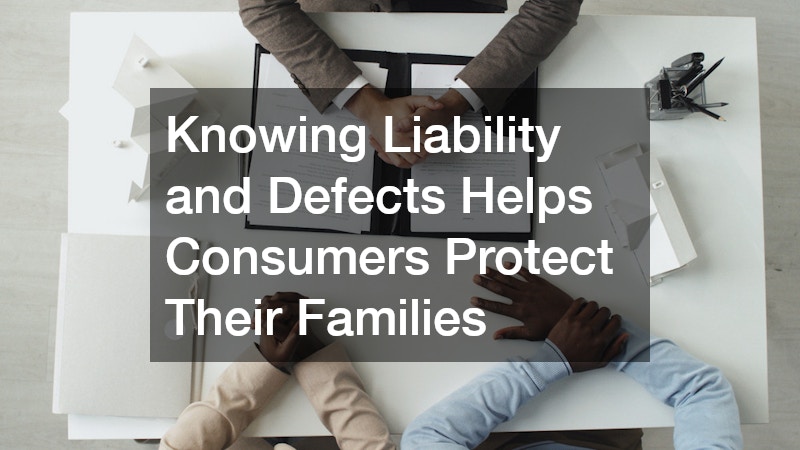In today’s consumer-driven world, defective products can pose serious risks. This article explains how a defective products attorney aids clients through product liability cases, ensuring justice and safety for all consumers.
What is Product Liability and How Does It Affect Consumers?
Understanding Product Liability Laws
Product liability laws are designed to hold manufacturers and sellers accountable for issuing defective products into the marketplace. These laws are crucial for protecting consumers from harm and ensuring fair compensation when injuries occur.
Understanding these laws helps consumers recognize their rights to receive safe products. This knowledge empowers individuals to take legal action when necessary.
The intricacies of product liability laws often require legal expertise to navigate. Proving negligence or fault in these cases can be complex and demands a detailed investigation.
Types of Defective Products
Defective products generally fall into three categories: design defects, manufacturing defects, and labeling defects. Design defects are inherent flaws in a product’s design that make it unsafe.
Manufacturing defects occur during the production process, making a product deviate from its intended design. Labeling defects, or failure to warn, arise when products lack adequate instructions or warnings.
Each type of defect poses unique challenges and risks to consumers. Identifying and categorizing defects accurately can significantly impact the outcome of a liability case.
When Should You Contact a Defective Products Attorney?
Identifying Signs of a Defective Product
Noticing unusual malfunctions, injuries, or safety warnings about a product are significant signs of potential defects. If a product does not perform as expected and causes harm, it may be defective.
Understanding when a product may be considered defective is crucial for taking timely legal action. Early recognition of these signs can aid in gathering necessary evidence.
Consumers must remain vigilant about monitoring the performance of products they use regularly. This awareness can help prevent injury and streamline legal processes if defects are found.
Initial Consultation and Case Evaluation
The initial consultation with a defective products attorney often involves sharing detailed accounts of the incident and injuries sustained. This meeting is a critical step in evaluating the viability of a case.
The attorney will assess the evidence and provide an initial overview of potential legal strategies. Transparency during this consultation ensures that clients receive realistic expectations about their case.
Clients should prepare to discuss all relevant details, including product receipts and medical records. An open dialogue is essential for building a strong legal foundation.
How Can a Defective Products Attorney Assist in Your Case?
Navigating the Legal Process
A defective products attorney expertly manages the legal procedures involved in product liability cases. From filing lawsuits to handling court documents, they ensure that all legal protocols are followed.
Throughout the process, the attorney offers guidance and support to clients, making complex legal matters understandable. This expertise is invaluable in preventing procedural errors that could jeopardize a case.
Moreover, attorneys often act as representatives during negotiations or court proceedings. Their role is not only to advocate but also to strategically position the case for the best possible outcome.
Gathering Evidence and Building a Strong Case
An attorney’s ability to gather comprehensive evidence is critical in building a compelling case. They work diligently to collect medical records, expert testimonies, and other vital documentation.
This strategic collection of evidence lays the groundwork for establishing the link between the product defect and consumer injuries. A well-documented case increases the likelihood of favorable settlements or verdicts.
Attorneys also collaborate with specialists to validate claims related to the defect. This collaboration strengthens the legal argument, demonstrating the defect’s direct impact on the injury that occurred.
What Compensation Can Be Expected from a Product Liability Case?
Types of Compensation Available
Successful product liability cases can result in various forms of compensation, including medical expenses, lost wages, and punitive damages. These compensations aim to alleviate the financial burden caused by defective products.
Compensatory damages cover actual costs incurred by the victim, like medical bills and rehabilitation. Punitive damages, however, are awarded to punish the defendant for egregious conduct and deter future negligence.
Understanding the types of compensation available helps clients gauge potential outcomes. Attorneys help clarify which compensatory measures are applicable based on the specifics of the case.
Factors That Influence Compensation Amount
Several factors, including the severity of the injury, the degree of negligence, and the impact on the victim’s life, influence the compensation amount. Courts examine these aspects carefully to determine fair reparation.
The availability of evidence and expert testimonies also significantly affects the compensation sought. More substantial evidence can lead to more favorable compensation for the victim.
Legal representation strategically negotiates these factors in court or settlement discussions. Their role is to secure a compensation package that comprehensively addresses the client’s losses and hardships.
Defective products can lead to severe consequences, but with the guidance of a knowledgeable defective products attorney, navigating the complexities of product liability cases becomes manageable and effective, safeguarding consumer rights and promoting safer products. An attorney’s expertise in handling these intricate cases is crucial for achieving justice.
By understanding liability laws, the types of defects, and the legal processes involved, consumers are better equipped to protect themselves and their families. The cooperation between affected individuals and legal professionals is essential for fostering accountability among manufacturers.
The pursuit of compensation not only addresses individual grievances but also encourages the development of a safer consumer products industry-wide. In essence, legal actions in product liability cases serve a greater purpose by enhancing public safety standards.




